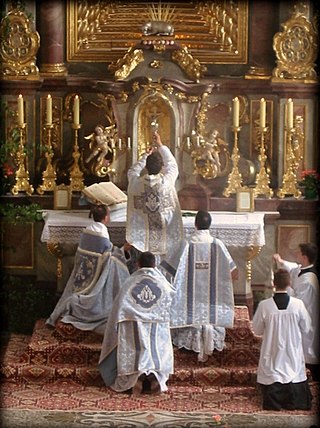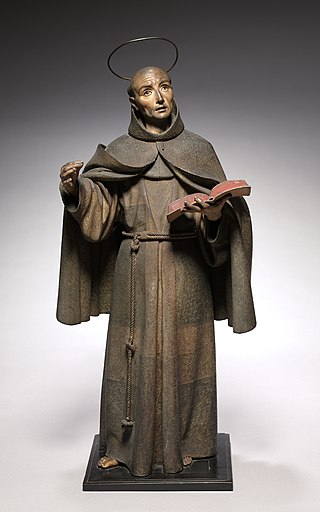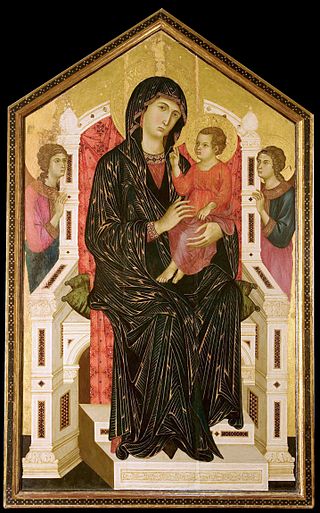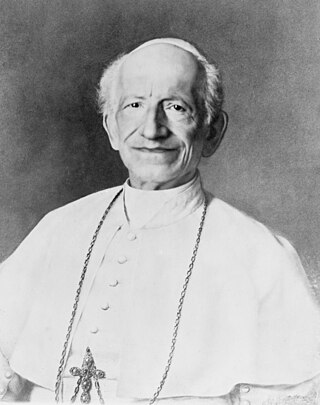Description
In it Benedict takes notes of the economic hardship and moral laxity occasioned by the recent World War, and cautions about "the advent of a universal republic, which is based on the absolute equality of men and the communion of goods, and in which there is no longer any distinction of nationality, does not recognize the authority of the father upon the children, nor the public authorities and citizens, nor of God on the men in civilian consortium. All things which, if implemented, would lead to terrible social convulsions, like that already happening now in no small part of Europe." [1]
He proposed that instead of being drawn to socialism, "the sworn enemy of Christian principles", working men should follow Saint Joseph as their guide and special patron. Benedict quoted his predecessor, Leo XIII:
For Joseph, of royal blood, united by marriage to the greatest and holiest of women, reputed the father of the Son of God, passed his life in labour, and won by the toil of the artisan the needful support of his family. It is, then, true that the condition of the lowly has nothing shameful in it, and the work of the labourer is not only not dishonouring, but can, if virtue be joined to it, be singularly ennobled. ... Through these considerations, the poor and those who live by the labour of their hands should be of good heart and learn to be just. If they win the right of emerging from poverty and obtaining a better rank by lawful means, reason and justice uphold them in changing the order established, in the first instance, for them by the Providence of God. But recourse to force and struggles by seditious paths to obtain such ends are madnesses which only aggravate the evil which they aim to suppress. [2]
He emphasized that the family is the "core and basis" of human society, and encouraged families to be guided by the example of the Holy Family. Benedict affirmed that strengthening the domestic society with purity, harmony and fidelity, would not only effect an improvement in private morals, but also in the life of the community.
Referencing the practices of honoring St. Joseph during the month of March, and on Wednesdays, he called on the bishops to promote veneration of Saint Joseph.

The Tridentine Mass, also known as the Traditional Latin Mass or the Traditional Rite, is the liturgy in the Roman Missal of the Catholic Church published from 1570 to 1962. Celebrated almost exclusively in Ecclesiastical Latin, it was the most widely used Eucharistic liturgy in the world from its issuance in 1570 until the introduction of the Mass of Paul VI.

Pope Benedict XV, born Giacomo Paolo Giovanni Battista della Chiesa, was head of the Catholic Church from 1914 until his death in January 1922. His pontificate was largely overshadowed by World War I and its political, social, and humanitarian consequences in Europe.

The Catholic Church, also known as the Roman Catholic Church, is the largest Christian church, with 1.3 billion baptized Catholics worldwide as of 2019. It is among the world's oldest and largest international institutions, and has played a prominent role in the history and development of Western civilization. The church consists of 24 sui iuris churches, including the Latin Church and 23 Eastern Catholic Churches, which comprise almost 3,500 dioceses and eparchies located around the world. The pope, who is the bishop of Rome, is the chief pastor of the church. The bishopric of Rome, known as the Holy See, is the central governing authority of the church. The administrative body of the Holy See, the Roman Curia, has its principal offices in Vatican City, a small enclave of the Italian city of Rome, of which the pope is head of state.
The Solemnity of Our Lord Jesus Christ, King of the Universe, commonly referred to as the Feast of Christ the King, Christ the King Sunday or Reign of Christ Sunday, is a feast in the liturgical year which emphasises the true kingship of Christ. The feast is a relatively recent addition to the liturgical calendar, instituted in 1925 by Pope Pius XI for the Roman Rite of the Catholic Church.
Cyriacus, sometimes Anglicized as Cyriac, according to Christian tradition, is a Christian martyr who was killed in the Diocletianic Persecution. He is one of twenty-seven saints, most of them martyrs, who bear this name, of whom only seven are honoured by a specific mention of their names in the Roman Martyrology.

The Dicastery for the Eastern Churches, previously named Congregation for the Oriental Churches or Congregation for the Eastern Churches, is a dicastery of the Roman Curia responsible for contact with the Eastern Catholic churches for the sake of assisting their development and protecting their rights. It also maintains whole and entire in the one Catholic Church the heritage and canon law of the various Eastern Catholic traditions. It has exclusive authority over the following regions: Egypt and the Sinai Peninsula, Eritrea and northern Ethiopia, southern Albania and Bulgaria, Cyprus, Greece, Iran, Iraq, Lebanon, Israel, Syria, Jordan and Turkey, and also oversees jurisdictions based in Romania, Southern Italy, Hungary, India and Ukraine.
The papal household or pontifical household, called until 1968 the Papal Court, consists of dignitaries who assist the pope in carrying out particular ceremonies of either a religious or a civil character.

Peter of Alcántara was a Spanish Franciscan friar who was canonized in 1669.
Inter pastoralis officii sollicitudines was a motu proprio issued 22 November 1903 by Pope Pius X that detailed regulations for the performance of music in the Roman Catholic Church. The title is taken from the opening phrase of the document. It begins: "Among the concernsof the pastoral office, ... a leading one is without question that of maintaining and promoting the decorum of the House of God in which the august mysteries of religion are celebrated...." The regulations pointed toward more traditional music and critiqued the turn toward modern, orchestral productions at Mass.

In Christian theology, a private revelation is an instance of revelation, in a broader sense of the term, of divine reality to a person or persons. It contrasts with revelation intended for humanity at large, which is sometimes termed public revelation.
The Pontifical Biblical Commission is a pontifical commission established within the Roman Curia to ensure the proper interpretation and defense of the Bible.
The Vatican Publishing House is a publisher established by the Holy See in 1926. It is responsible for publishing official documents of the Roman Catholic Church, including Papal bulls and encyclicals. On 27 June 2015, Pope Francis decreed that the Vatican Publishing House would eventually be incorporated into a newly established Secretariat for Communications in the Roman Curia.

Ad Caeli Reginam is an encyclical of Pope Pius XII, given at Rome, from St. Peter's Basilica, on the feast of the Maternity of the Blessed Virgin Mary, the eleventh day of October, 1954, towards the end of the Marian year, in the sixteenth year of his Pontificate. The encyclical is an important element of the Mariology of Pope Pius XII. It established the feast Queenship of Mary.

Mariological papal documents have been a major force that has shaped Roman Catholic Mariology over the centuries. Mariology is developed by theologians on the basis not only of Scripture and Tradition but also of the sensus fidei of the faithful as a whole, "from the bishops to the last of the faithful", and papal documents have recorded those developments, defining Marian dogmas, spreading doctrines and encouraging devotions within the Catholic Church.

The 1983 Code of Canon Law, also called the Johanno-Pauline Code, is the "fundamental body of ecclesiastical laws for the Latin Church". It is the second and current comprehensive codification of canonical legislation for the Latin Church of the Catholic Church. It was promulgated on 25 January 1983 by John Paul II and took legal effect on the First Sunday of Advent 1983. It replaced the 1917 Code of Canon Law which had been promulgated by Benedict XV on 27 May 1917.
Mirae caritatis is an encyclical of Pope Leo XIII on the Holy Eucharist given on 28 May 1902. Its theme is mainly the marvelous effects of devotion to the Holy Eucharist in the moral and spiritual life of the faithful.

Quamquam pluries is an encyclical on Saint Joseph by Pope Leo XIII. It was issued on August 15, 1889 in Saint Peter's Basilica in Rome.
Pope Pius XI instituted a new rule for setting the date for the start of a papal conclave to elect a new pope by promulgating the document Cum proxime on 1 March 1922, less than a month after his own election. The four non-European cardinals had not participated in the conclave that elected him in February. Three of them arrived too late and one did not attempt the journey. With Cum proxime, Pius XI extended the time between the death of a pope and the start of the conclave to increase the likelihood that cardinals from distant locations could reach Rome in time to participate.

Aperuit illis is an apostolic letter, by Pope Francis, issued "motu proprio" on September 30, 2019, the Feast of Saint Jerome, instituting the annual observance of the 3rd Sunday of Ordinary Time as "Sunday of the Word of God", devoted to the celebration, study and dissemination of the Word of God. The first "Sunday of the Word of God" occurred on January 26, 2020. The Pope said that he wrote the Apostolic Letter in response to requests from around the world to celebrate the Sunday of the Word of God.











